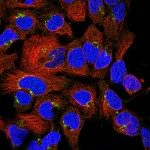Lien vers Pubmed [PMID] – 17556367
J. Biol. Chem. 2007 Aug;282(31):22747-56
Conversion of PrP(C) into PrP(Sc) is the central event in the pathogenesis of transmissible prion diseases. Although the molecular basis of this event and the intracellular compartment where it occurs are not yet understood, the association of PrP with cellular membranes and in particular its presence in detergent-resistant microdomains appears to be of critical importance. In addition it appears that scrapie conversion requires membrane-bound glycosylphosphatidylinositol (GPI)-linked PrP. The GPI anchor may affect either the conformation, the intracellular localization, or the association of the prion protein with specific membrane domains. However, how this occurs is not known. To understand the relevance of the GPI anchor for the cellular behavior of PrP, we have studied the biosynthesis and localization of a PrP version which lacks the GPI anchor attachment signal (PrP Delta GPI). We found that PrP Delta GPI is tethered to cell membranes and associates to membrane detergent-resistant microdomains but does not assume a transmembrane topology. Differently to PrP(C), this protein does not localize at the cell surface but is mainly released in the culture media in a fully glycosylated soluble form. The cellular behavior of anchorless PrP explains why PrP Delta GPI Tg mice can be infected but do not show the classical signs of the disorder, thus indicating that the plasma membrane localization of PrP(C) and/or of the converted scrapie form might be necessary for the development of a symptomatic disease.

